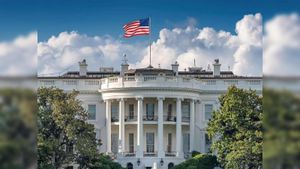China’s relationship with African nations is complex, marked by deep historical ties and significant economic ambitions. President Bola Tinubu of Nigeria has recently emphasized the importance of strengthening partnerships with China, alongside France and Denmark, to spur growth across various sectors including education, health, and infrastructure.
During his ceremonial reception for the new ambassadors from these nations at the State House, Tinubu stressed the need for these relationships to yield tangible benefits for the Nigerian populace. "Macron has been a good friend over many years, and I look forward to our State Visit to Paris to solidify our relationship, ensuring our citizens reap the benefits of our diplomacy," he stated.
Meanwhile, the Chinese ambassador, Yu Dunhai, highlighted the longstanding friendship between Nigeria and China which has persisted for over fifty years. He noted how Nigeria is pivotal to China’s broader strategy to develop its influence across the African continent, particularly through economic initiatives grounded in mutual respect. He stated, "We have enjoyed more than half a century of relations, treating each other with equity. Our partnership has grown significantly, especially in economics and trade."
The backdrop of this strengthening of ties rests on China’s growing presence across Africa, marked by initiatives such as the Forum on China–Africa Cooperation (FOCAC). Launched in 2000, FOCAC serves as the primary platform through which China channels its influence, providing financial assistance, infrastructure investment, and trade opportunities to various African countries.
At the most recent FOCAC summit held in Beijing, President Xi Jinping pledged 360 billion yuan (roughly $50.7 billion) to support African development over the next three years. This announcement is part of China’s strategic aim to bolster its connections on the continent, drawing attention to Africa's vast stores of natural resources and its strategic geopolitical position. Through investment, China aims to create jobs and support infrastructure projects, securing not just economic growth for African nations, but also solidifying its influence over the region.
Economic ties have been complemented by China’s significant involvement in infrastructure development across Africa, with more than 3,000 Chinese businesses operating within the continent. Key initiatives include major transport corridors and energy projects, such as the recently completed Addis Ababa-Djibouti and Mombasa-Nairobi railways. Through these infrastructure investments, China has positioned itself as the leading trading partner for many African nations, with approximately 25% of Africa’s exports going to China, primarily consisting of minerals and metals.
On the diplomatic front, Tinubu underscored the necessity of activating existing agreements with China to facilitate economic growth, stating, "I enjoyed my visit to China, particularly our signing agreements on trade and economic progress for both countries." The growing cooperation reflects China’s ambitions not only as a traditional economic partner but also as a key player influencing regional security and political stability.
China’s approach to Africa is reflective of its broader narrative of non-interference, which advocates for respect of sovereignty and mutual benefit. This principle dates back to the Bandung Conference of 1955, where various nations affirmed their intent for peaceful coexistence. Yet, the balance is delicate, as China’s deep engagement often draws scrutiny over its motives and the impact on local economies.
Across the continent, countries like the Democratic Republic of Congo, which alone contributes around 70% of the world’s cobalt, and Nigeria, rich in oil and gas, symbolize the depth of resources China seeks to secure. This has led to heightened competition with Western powers, particularly the United States, as both strive to secure energy resources and raw materials needed for high-tech industries and renewable energy technologies.
While the West has traditionally focused on promoting democratic values and human rights, the U.S. has recently pivoted to view Africa through the lens of supply chain stability—especially for minerals needed for batteries used in electric vehicles. Observers have noted tensions arising from such dynamics, with numerous African nations caught between competing interests.
Tinubu’s diplomatic outreach reflects not only Nigeria's plans for economic cooperation but also the complex web of international diplomacy where China is often seen as both collaborator and competitor. The recent push to solidify ties with China, as highlighted by Tinubu's meetings, shows Nigeria's intent to leverage its geopolitical stature within ECOWAS and the African Union to bring about mutual growth and development.
Yet, the narrative surrounding Africa’s relationship with China is not solely one of partnership. Critics argue China’s influence can lead to dependency, overshadowing local industries and raising concerns about debt sustainability tied to large-scale infrastructure loans. Proponents, on the other hand, argue such investments have the potential to ignite domestic growth and marketplaces.
The contours of China’s approach to Africa also intertwined with its broader ambitions within the Global South. Observers suggest this could lead to new forms of engagement, where Africa acts as both partner and participant within the reshaped global order, challenging the traditional dominance of Western powers. This dynamic fosters hope but also caution as African nations strive to balance these relationships wisely.
Conclusively, the current climate presents both opportunities and challenges for African nations as they forge partnerships with global powers like China. It remains imperative for African leaders to chart paths which not only prioritize immediate economic gains but also safeguard long-term interests, ensuring independence and resilience against external pressures.



